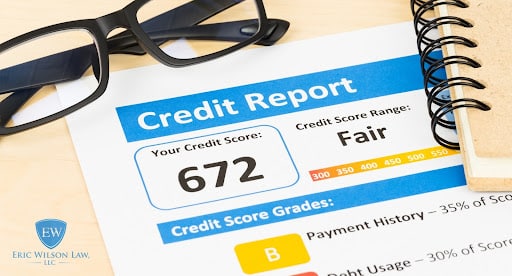Fair Credit Reporting Act
If you’ve ever disputed outdated negative information on your credit report, placed a fraud alert on your credit file, or even been denied credit by a lender, then you’ve probably heard of the Fair Credit Reporting Act (FCRA). The federal law provides specific instructions about the way credit reporting agencies can gather, report, and sell your private financial information. Understanding the FCRA is a crucial step in regaining control of your credit and your finances, especially if you’ve recently filed for bankruptcy. Below, the legal team at Eric Wilson Law LLC discusses the complexities of the law as well as your legal rights. If you believe that creditors or credit bureaus have violated one or more of your rights listed in the FCRA, you may have grounds to sue.
For more information on how Eric Wilson Law LLC can protect your rights and help you achieve your goal of financial freedom, call 205-349-1280 today.

What is the Fair Credit Reporting Act (FCRA)?
The Fair Credit Reporting Act (FCRA) is a law that was passed in 1970 that basically requires credit reporting agencies to report the most accurate information possible on someone’s credit history. The ultimate goal of this law is to provide utmost consumer financial protection from the three nationwide credit bureaus: TransUnion, Equifax, and Experian. That’s because these agencies buy and sell a large amount of private financial information.
Not only does the FCRA keep credit reporting agencies in line, but it keeps credit unions and banks in line as well. That’s because banks and credit unions have access to large amounts of financial information, medical records, and even rental history records.
What is the Fair and Accurate Credit Transactions Act (FACTA)?
The Fair and Accurate Credit Transactions Act (FACTA) is basically a 2003 amendment to the Fair Credit Reporting Act (FCRA). The main purpose of this federal law is to protect consumers from identity theft. FACTA was created in response to a rise in identity theft cases in 2003. Unfortunately, as technology continues to advance and become a major part of our everyday lives, identity theft cases have only picked up since 2003.
In an attempt to decrease cases of identity theft, FACTA allows consumers to initiate a fraud alert on one or more of their credit cards and also receive one free credit report annually. The Red Flag Program Clarification Act of 2010 amended some data security provisions included in FACTA. The Red Flags Rule, created by the Federal Trade Commission, requires all creditors and financial institutions to create an identity theft prevention and detection program when it comes to opening covered accounts. Because of this rule, credit and debit card issuers now have to follow several steps in order to validate someone’s address change.
Even with all these federal laws and regulations in place, the Federal Trade Commission claims that identity theft victims lost approximately $5.8 billion to fraudulent activity alone in 2021.
What Are Credit Reporting Agencies (CRA)?
A credit reporting agency, also known as a consumer reporting agency, is basically responsible for gathering, reporting, and keeping track of all your credit information. According to Debt.org, credit reporting agencies have more than 200 million Americans’ credit information.
You may be wondering: what do these consumer reporting agencies do with all this credit information? Well, they sell information to various businesses and credit bureaus so they can make decisions on if you’re financially responsible enough to receive a car loan, for example.
You may also be wondering: where do credit reporting agencies get all this information? The answer is information suppliers, which are just businesses that give credit to customers. Information suppliers are the ones that report information to these agencies. A consumer reporting agency will also collect information from bankruptcy filings, state or federal court judgments, and other types of public records.
Credit reporting agencies then take all this information and formulate it into a credit score which basically reflects your financial health. With this credit score, credit bureaus and potential lenders can decide whether or not they want to give you loans and credit.
What is the Credit CARD Act?
The Credit Card Accountability, Responsibility, and Disclosure Act is one of three smaller acts included within the Fair Credit Reporting Act. Under this act, credit card companies can’t increase the interest rate on a pre-existing balance. If credit card companies want to increase the interest rate on a new balance, they must provide consumers with a 45 day notice. Lastly, the Credit CARD Act requires credit card companies to set payment deadlines that are consistent.
What is the Dodd-Frank Act?
The Dodd-Frank Act (DFA) is another act that’s included within the Fair Credit Reporting Act. It was passed in 2010 in order to mandate financial institutions to engage in fair practices. For example, major financial institutions must practice transparency and accountability towards consumers.
Additionally, the act was passed partially in response to this nation’s last major recession in 2008. So some provisions in this act work to potentially prevent another major recession. For example, the DFA created a warning system for the federal government so that it’s aware of major issues before they have a chance to take a huge hit to our national economy.
Lastly, the DFA stopped bailouts for good. In other words, taxpayer money can no longer be used to save finance companies that are struggling to function.
What is the Volcker Rule?
The Volcker Rule falls under the Dodd-Frank Act. The rule was passed in 2010 but didn’t actually take effect until 2015. Its main purpose is to promote consumer financial protection by preventing banks from making high-risk investments using money from its own accounts. Basically, the Volcker Rule states that banks can’t participate in proprietary trading nor can they gain ownership interest in private equity funds or hedge funds.
Again, this rule was created partially in response to the 2008 recession. One of the major issues that led to the recession was that banks actively made risky bets against businesses (AKA: hedging bets) which, in turn, created financial danger for their customers.
What is the Consumer Financial Protection Bureau?
The Consumer Financial Protection Bureau (CFPB) serves to amplify the voices of consumers who are wronged by credit bureaus, consumer reporting agencies, creditors, lenders, etc. If you notice any inaccurate information on your credit report, you would file a complaint to the Consumer Financial Protection Bureau to ensure that you have accurate credit information on your credit report moving forward. If a credit bureau engages in any unfair practices, again, you would turn to the Consumer Financial Protection Bureau for assistance and justice.
What is the SEC Office of Credit Ratings?
The SEC Office of Credit Ratings oversees credit rating agencies with the goal of protecting investors and continuing fair practices. The Office of Credit Ratings was created as an extension of the Dodd-Frank Act.
But what exactly are credit ratings? A credit rating is your credit score. This credit score number determines your creditworthiness as a borrower.
Your Rights Under the Fair Credit Reporting Act
Listed below are your rights under the Fair Credit Reporting Act and the Fair and Accurate Transactions Act.
- If someone has used your credit file information against you, you have the right to know. For example, if a potential employer denies you just because of your consumer report, you have a right to know. Additionally, you have a right to receive the contact information of the agency that provided your credit information for employment purposes.
- You have a right to know exactly what’s in your credit file, especially if someone has recently taken adverse action against you because of your consumer report. You also have the right to know what’s in your credit file if you’re an identity theft victim and you’ve issued an extended fraud alert, you’re job-hunting, there’s inaccurate information on your file, or you’re on public assistance.
- You have a right to receive a free copy of your credit report every year from a nationwide credit bureau. Credit scores and credit reports generally make or break your ability to apply for loans or credit. Therefore, having a general idea of your current credit score is crucial.
- If there’s inaccurate or incomplete information on your credit report, you have the right to dispute it. Consumer reporting agencies are then required to investigate your claim and correct any errors on your credit report within 30 days.
- Consumer reports can’t have any outdated negative information. If you notice outdated negative credit information, you have the right to dispute it. For example, late payments will generally stay on your credit report for 7 years. The same goes for a Chapter 7 or Chapter 13 bankruptcy filing, which will stay on your credit report for up to 10 years. If you notice that a late payment or a bankruptcy has stayed on your credit report for longer than 7 or 10 years, you have the right to dispute it. In response, the consumer reporting agency must remove the late payment or the bankruptcy from your credit report.
- You have the right to limit prescreened credit and insurance offers that you may receive based on your credit report. These offers always come with a toll-free number. All you have to do is ask to remove your name and contact information from these offer lists. You can also call (888) 5-OPTOUT (888-567-8688) to opt out of these offers.
- If anyone violates your rights that are protected under the Fair Credit Reporting Act, you have the right to sue and pursue damages. Call Eric Wilson Law LLC in Tuscaloosa, AL if you need legal representation.
- You have the right to issue a security freeze on your credit report. In other words, you’re allowed to tell a credit reporting agency that you don’t want them releasing your private information without your written consent. It’s important to note that if you do obtain a security freeze, you probably won’t have timely requests or approvals of loans, mortgage, credit, etc.
- You have the right to place an extended fraud alert on your credit file if you’re an identity theft victim. Normal fraud alerts will stay on your file for up to 1 year. Extended fraud alerts will stay on your file for 7 years. If a credit reporting agency sees that your file has any kind of fraud alert on their file, they must take extra steps to obtain proper identification from you, especially before they give you new credit.
- If you’re an active duty military member, you have the right to place an active duty alert on your file. If you do this, credit reporting agencies must jump through extra hoops to make sure you are who you say you are. This active duty alert is especially useful for military members who must go on long deployments. It ensures that active duty military personnel don’t become victims of identity theft while they’re out of the country. An active duty alert generally stays on file for 1 year, but you can renew it or cancel it at any time.
How We Can Help
The legal team at Eric Wilson Law LLC can help with the following issues related to the Fair Credit Reporting Act:
- Are creditors following federal law in how items are reported on your credit report?
- Are creditors following federal law in the inquiries they make on your credit?
- Are creditors reporting accurately your accounts after you receive a bankruptcy discharge?
- Have you reviewed your own credit reports to determine their accuracy?
All of these issues can not only affect your credit score, but can also be a violation of your rights listed in the Fair Credit Reporting Act. In other words, you may actually have grounds to file a lawsuit against creditors and credit bureaus for these mistakes. Let Eric Wilson review your credit reports to make sure your creditors are complying with federal law – The Fair Credit Reporting Act and the Fair Debt Collections Practices Act.

Call Eric Wilson Law Today
Eric Wilson Law LLC is a debt-relief agency in Tuscaloosa, AL. Our team is passionate about helping our clients regain control of their finances so that they can live happier, stress free lives. If you’re feeling crushed under the weight of your debt, there is hope through a bankruptcy filing or another form of financial management. To schedule a free consultation with Eric Wilson, call 205-349-1280 today.
Practice Areas
Office Location
Eric M. Wilson, LLC
1902 8th St Tuscaloosa, AL 35401
205-708-2115
Tuscaloosa Law Office Map and Directions
